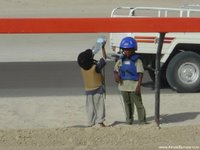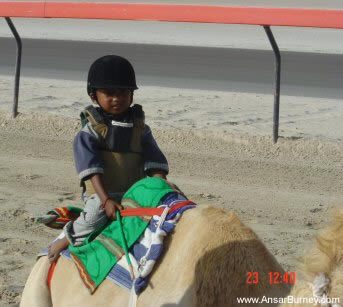United Arab Emirates: The Land of the Camel Jockey (Camel Jockey: a child slave who is abused, starved, and forced to ride camels for entertainment)


Rory sez: the term "Camel Jockey" is no joke, no racist epithet. It's a reference to form of slavery and child abuse that has provided great entertainment to the ruling class in United Arab Emirates. This practice is so vile that it helped get Condi's State Department posse's condemnatory Tier 3 rating for our new ports-runnin'-partners.

Tier 3 is reserved for countries "whose governments do not fully comply with the minimum standards for the elimination of trafficking and are not making significant efforts to do so.”

Here's what the State Department had to say about camel jockeys in a report issued in 2005:
"A number of reliable sources confirm that young boys were still being used as camel jockeys during the year. According to NGO and press reports, including one in-depth documentary by HBO's "Real Sports" program which aired in October, many boys remained subject to extremely harsh living and working conditions that, at times, led to serious injuries and death.The program alleged that not only were very young boys still being used as camel jockeys, but that these boys were subjected to physical abuse, including sexual abuse, by their supervisors and trainers.

While there is no evidence that the camel farm owners/employers participated personally in these abuses, there is likewise no evidence that the camel farm owners and employers took any measures to prevent or stop the abuse occurring on their farms.
Further reports accused some supervisors of subjecting boys to malnutrition. One child was killed in September after falling from a camel during a race, and many more children were reportedly injured from camel racing.

The HBO television documentary highlighted the efforts by the Ansar Burney Welfare Trust International (ABWTI), a Pakistan-based human rights NGO, which has helped rescue almost 400 children from farms and tracks within the country over the past year."
Supposedly, under international pressure, the UAE has announced new rules for age and weight limits on camel jockeys, but rights observers will believe it when they see it. Human rights watch says:
"Large numbers of young boys are annually trafficked to the UAE to be trained as camel jockeys, and in 2005 the UAE government estimated the number of children working as camel jockeys to be between 1,200 and 2,700; international organizations have put the numbers much higher, at between five thousand and six thousand.Responding to the international criticism, UAE President Sheikh Khalifa bin Zayed al Nahyan issued a federal decree in July 2005 requiring that all camel jockeys must be eighteen years of age or older. The law stipulated that violators will be jailed for up to three years and/or fined a minimum of Dh50,000 (U.S.$13,600). The government’s ability to institute mechanisms of enforcement will be tested in the coming year."
Past claims of Camel Jockey reform have been pure camelshit. As Anti-Slavery International notes: They sent a photographer to the United Arab Emirates to photograph children racing and training in the Gulf state.

The photographs bely the UAE rulers' repeated statements that this practice had been stopped. The Government announced that using children under 15 and lighter than 45 kilograms to race camels would be banned from 1 September 2002 and offenders punished. Guess what, folks? Didn't happen. Anti-slavery International has a gallery of photos taken in Dubai showing little camel jockeys at work a couple years after the announcement.
What is it like to be a camel jockey in UAE? Here's one kid's description:
“They used to wake us at two or three in the morning. If we didn’t get up or they thought we were lazy they would beat us with sticks,” he said. “We had to clean up the camel dung with our hands.”
The boys were given brackish water and fed little more than bread or biscuits to keep their weight down. Any considered to have become too heavy would have weights tied to their backs and be made to run under the desert sun.
Serial offenders would be hung by their wrists from chains. Many claim that they were sexually abused by the trainers.
Race days were the worst. As the camels thundered around the track at up to 40mph, riders were often knocked to the ground and trampled underfoot.
Another boy, Zulfiqar, 10, said he had seen several riders break their arms or necks or die from their injuries. When the choice is between tending a thoroughbred camel worth hundreds of thousands of pounds or a boy bought for a few thousand, the animals get priority. “They always look after the camels first,” he said.
Rory sez: sounds pretty much like a prep school for life at Guantanamo. We probably should classify our own country as Tier 3 and cut off humanitarian aid here in the U.S. Wait, Bush did cut off humanitarian aid to the U.S! Sonofabitch is sanctioning himself for human rights violations! Now I get it. That explains his budget!
Human rights lawyer and activist Ansar Burney, of Pakistan, has apparently done more than any one person or government to help on this issue. The man sounds like a real hero. I mean a REAL hero. According to his organization's web site, UAE has made strides against the problem of underage camel racing.

Okay, leaving aside the question of child slavery in the Camel Racing industry (and check out what Burney says about Saudi Arabia in this regard), how is the United Arab Emirates when it comes to those democratic values about which Bush blows so much smoke up our asses that we're in danger of becoming airborne human hot-air balloons? Well the short answer is that UAE sucks pretty horribly in this regard as noted in the table at the top of this post.

Here's a little more detail on those items, which Rory culled from the U.S. State Department's own Country Reports on Human Rights Practices:
There are no political organizations, political parties, independent human rights groups, or trade unions.
Internet access, which was open to public use with an estimated 1.11 million users, was provided through a state-owned monopoly, Etisalat. A proxy server blocked material regarded as pornographic, violent, morally offensive, or promoting radical Islamic ideologies, as well as anti-government sites. The proxy server occasionally blocked individual news stories on news websites such as CNN. The Etisalat proxy server provides access to AOL email but blocks other features that enable users to chat online, and (according to Etisalat) those that facilitate hacking.The Internet monopoly solicits suggestions from users regarding "objectionable" sites, and at times the Government responds by briefly blocking some politically oriented sites, which are sometimes later unblocked. Etisalat also blocks commercial "voice-chat" sites on the Internet.
The Government prohibits Muslims from converting to other religions. Although non-Muslims in the country are free to practice their religion, they are subject to criminal prosecution, imprisonment, and deportation if found proselytizing or distributing religious literature to Muslims.
Unrestricted foreign travel and emigration is permitted for male citizens, except those involved in legal disputes under adjudication. Custom dictates that a husband can bar his wife, minor children, and adult unmarried daughters from leaving the country by taking custody of their passports.

Fornication is a crime. The Government may imprison and deport noncitizen women if they bear children out of wedlock. In the event that a court sentences a woman to prison for such an offense, local authorities, at the request of the prisoner, may hold the newborn children in a special area within the prison or place them with a relative. In rare cases, children are held in other facilities until the mother's release from prison.
In practice, trafficking in women and girls used as prostitutes and domestic servants, men used as servants, laborers, and unskilled workers, and very young boys used as camel jockeys, continued to be serious problems. The Government has pledged and taken some measures of limited effectiveness against these practices.
Both civil and Shari'a law criminalize homosexual activity.
1995, the country has been suspended from the U.S. Overseas Private Investment Corporation (OPIC) insurance programs because of the Government's non-compliance with some internationally recognized worker rights standards.
A de facto ban dating from 2002 prohibiting 10 prominent intellectuals from publishing opinion pieces in the country's Arabic and English language media continued.
Muslim women are forbidden to marry non-Muslims. In such cases, both parties can be arrested and tried.
There are no democratically elected institutions or political parties.
Source of the above:
But nobody in the Hallibusncheney administration gives a Shrew's sphincter about any of this. As several have pointed out, like

Rory declined to apologize.


13 Comments:
They also have little robots to ride the camels now. They don't have to feed them and they can just save the little boys for sex.
Bush cut off humanitarian aid to the US! Good point! If these are our friends in the Middle east...
Yeah Gordon. I'm afraid you may be right. The robots were beyond the scope of this one, I guess, but I've seen the pictures of them ... kind of makes the whole obsession with camel racing look a bit ridiculous ...
That's right Lew ... who needs ...
mr shock you have outdone yourself with this posting. i thank you so very much.
there was even an instance where a family from either uae or saudi arabia was caught with at least ONE SLAVE working in their home in the u.s.
i know we are on the uae right now, but there is slavery everywhere even here. we must never remain silent. i just posted a piece on slavery in the sudan. earlier i did a piece on slavery IN CONNECTICUT. it IS everywhere.
roger that, rose ... yeah, your posting on Sudan is right on ... and CT ... I really CAN see why Bush has cut off aid to the US
We do have some wonderful 'friends', don't we?
Rory,
I am so glad that I connected with you as a blograde, because I think you have a great skill with discussing a tragic topic while also using humor to point out some of the twisted 'highlights'. Excellent post. Thank you.
Thanks Lily ... I'm glad too ... I love your work over at your blog home and am always happy when you visit here
Shocking. Childrens abuse is what bothers me the most in our world. Great (almost scientific) research though. Thx
Thanks Dmitri ... yeah ... it is a hideous situation
Is that unique to UAE? How about Israel?
http://news.bbc.co.uk/1/hi/world/middle_east/4380067.stm
"Between 3,000 and 5,000 women have been smuggled into Israel in the past four years to work as prostitutes, according to a parliamentary inquiry.
"The report described how the women are sold at public auctions for as much as $10,000 and forced to work up to 18 hours a day"
Besides, the web search shows that UAE has banned and taken measures against child camel jockeys.
"In July 2002, the UAE Government announced that using children under-15 and lighter than 45 kilograms to race camels would be banned from 1 September 2002 and offenders punished."
"in February 2004, the US State Department Country Report on Human Rights Practices refers to the UAE Government implementing and enforcing the ban. And, in June 2003, the US Trafficking in Persons Report commended the UAE's efforts against trafficking, including child camel jockeys, raising it from Tier 3, reserved for the greatest offenders, to Tier 1, comprising countries whose governments are prohibiting and punishing acts of trafficking."
anonymous ... I'm sure it's not unique to UAE ... I understand that camel racing is big in Saudi Arabia, too ... yeah ... look through the sources cited ... there have been efforts ... Burney is probably the most responsible for reforms at all ... but as you can see, even after the alleged reforms, the problem was documented to still be occurring
.... and the problem of trafficking in humans is not unique to UAE ... I don't think anything I have ever said anywhere would lead one to believe that I take that position ...
Clocking in here incredibly late, but I just came across this blog. Having spent the best part of 15 years in the Emirates, I can say that they've come on leaps and bounds during that time - and not just economically.
A lot of legislation for the protection of citizens, residents and workers has been brought in, especially since they signed up to the ILO charter 2 years ago.
However, as is common with a country with a huge public sector bureaucracy, the actual implementation and enforcing can at times be patchy at best.
In saying that, attempting to compare the conditions, attitudes and norms in the Emirates compared to the rest of the Middle East - it shows up as a shining example of what slow but progressive change can bring.
Since Sheikh Zayed died two years ago, his son has already started to slowly introduce a new wave of modernisation, and this of a democratic nature, with a Federal National Council. Admittedly it's going to be small, and only half of them elected, but you need to crawl before you can walk. And the UAE has traditionally been a late adopter of such radical trends, as they're happy to let other nations rush head-long into it and make a plethora of mistakes which they'll learn from.
Despite all this, I won't deny there's a dark underbelly to the place. But then there is with any country where large amounts of money and precious commodity change hands.
Post a Comment
<< Home